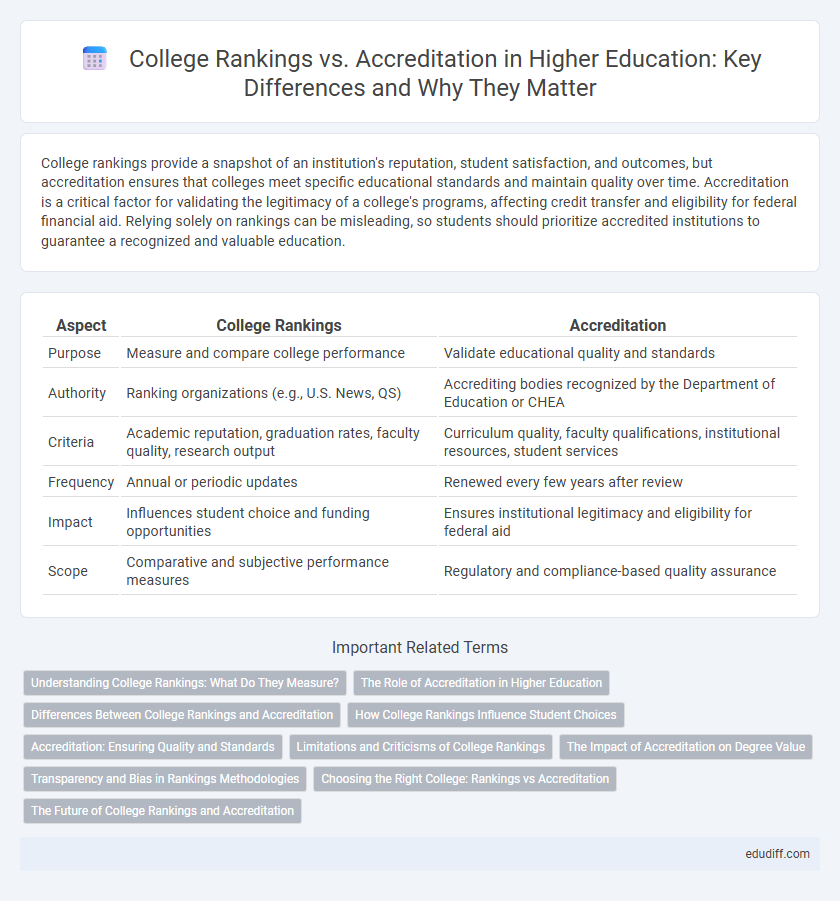College rankings provide a snapshot of an institution's reputation, student satisfaction, and outcomes, but accreditation ensures that colleges meet specific educational standards and maintain quality over time. Accreditation is a critical factor for validating the legitimacy of a college's programs, affecting credit transfer and eligibility for federal financial aid. Relying solely on rankings can be misleading, so students should prioritize accredited institutions to guarantee a recognized and valuable education.
Table of Comparison
| Aspect | College Rankings | Accreditation |
|---|---|---|
| Purpose | Measure and compare college performance | Validate educational quality and standards |
| Authority | Ranking organizations (e.g., U.S. News, QS) | Accrediting bodies recognized by the Department of Education or CHEA |
| Criteria | Academic reputation, graduation rates, faculty quality, research output | Curriculum quality, faculty qualifications, institutional resources, student services |
| Frequency | Annual or periodic updates | Renewed every few years after review |
| Impact | Influences student choice and funding opportunities | Ensures institutional legitimacy and eligibility for federal aid |
| Scope | Comparative and subjective performance measures | Regulatory and compliance-based quality assurance |
Understanding College Rankings: What Do They Measure?
College rankings primarily measure factors such as academic reputation, graduation rates, faculty credentials, student selectivity, and financial resources to evaluate institutional performance. These rankings often rely on quantitative data like standardized test scores, alumni success, and research output, offering a comparative snapshot of colleges. Understanding their methodology is crucial since rankings emphasize certain metrics but may overlook accreditation status, which ensures specific quality and compliance standards.
The Role of Accreditation in Higher Education
Accreditation in higher education serves as a critical quality assurance mechanism, ensuring that institutions meet established academic standards and deliver credible degrees. Unlike college rankings, which often prioritize reputation and selective criteria, accreditation evaluates core elements such as curriculum rigor, faculty qualifications, and student support services. This regulatory endorsement influences federal funding eligibility, transferability of credits, and employer recognition, ultimately impacting students' educational and career outcomes.
Differences Between College Rankings and Accreditation
College rankings primarily evaluate institutions based on performance metrics such as graduation rates, faculty credentials, and student satisfaction to guide prospective students, while accreditation assesses whether colleges meet established standards of educational quality set by official accrediting agencies. Rankings are often influenced by subjective methodologies and can fluctuate annually, whereas accreditation is a rigorous, ongoing process ensuring institutions comply with regulatory and academic criteria. Understanding these fundamental differences helps students distinguish between popularity or prestige and the institution's legitimacy and academic legitimacy.
How College Rankings Influence Student Choices
College rankings significantly impact student choices by highlighting factors such as graduation rates, faculty qualifications, and post-graduate employment statistics. These rankings often prioritize quantifiable data, leading students to prioritize institutions with higher perceived prestige and outcomes. While accreditation ensures educational standards, rankings directly shape applicant preferences by emphasizing reputation and competitive advantages in the job market.
Accreditation: Ensuring Quality and Standards
Accreditation serves as a critical benchmark for ensuring quality and standards in higher education, providing a rigorous evaluation of institutions' academic programs, faculty qualifications, and administrative processes. Accredited colleges must meet criteria set by recognized accrediting bodies, which helps guarantee consistent educational quality and enhances the institution's credibility with employers and other universities. This formal validation process supports student confidence in their educational investment and can significantly impact financial aid eligibility and credit transferability.
Limitations and Criticisms of College Rankings
College rankings often face criticism for emphasizing quantitative metrics such as selectivity and financial resources over qualitative factors like teaching quality and student satisfaction. These rankings can mislead prospective students by oversimplifying complex educational experiences into a single score, while accreditation evaluates institutions based on comprehensive standards ensuring academic quality and institutional integrity. The reliance on rankings may encourage schools to prioritize short-term improvements in metrics rather than long-term educational outcomes and innovation.
The Impact of Accreditation on Degree Value
Accreditation directly enhances the value of a degree by ensuring academic programs meet rigorous quality standards established by recognized accrediting bodies, which employers and institutions trust. Unlike college rankings that often reflect reputation or survey results, accreditation validates the reliability and credibility of an institution's curriculum, faculty qualifications, and learning outcomes. Graduates from accredited colleges gain better access to professional licensure, graduate education, and competitive job markets, demonstrating that accreditation significantly influences degree worth.
Transparency and Bias in Rankings Methodologies
College rankings often lack transparency in their methodologies, leading to potential biases that can misrepresent institutional quality. Accreditation processes provide standardized evaluations based on established criteria, offering a more objective measure of academic standards. Transparency in rankings requires disclosure of weighting factors and data sources to mitigate bias and enhance trust among prospective students.
Choosing the Right College: Rankings vs Accreditation
Choosing the right college involves weighing college rankings and accreditation, as both impact education quality and future opportunities. Accreditation guarantees that the institution meets established standards, ensuring recognized degrees and eligibility for federal aid, while rankings provide insights into reputation, faculty quality, and student outcomes. Prospective students should prioritize accredited institutions to secure valid credentials and consider rankings as a supplementary tool to assess specific programs and campus experiences.
The Future of College Rankings and Accreditation
College rankings and accreditation processes are evolving to incorporate more comprehensive data on student outcomes, equity measures, and technological integration, reflecting the changing landscape of higher education. Emerging AI-driven analytics and real-time performance tracking promise to enhance the accuracy and transparency of evaluations, helping students make more informed decisions. Future models will likely emphasize adaptability and continuous improvement, ensuring institutions meet rigorous standards while fostering innovation and inclusivity.
College Rankings vs Accreditation Infographic

 edudiff.com
edudiff.com